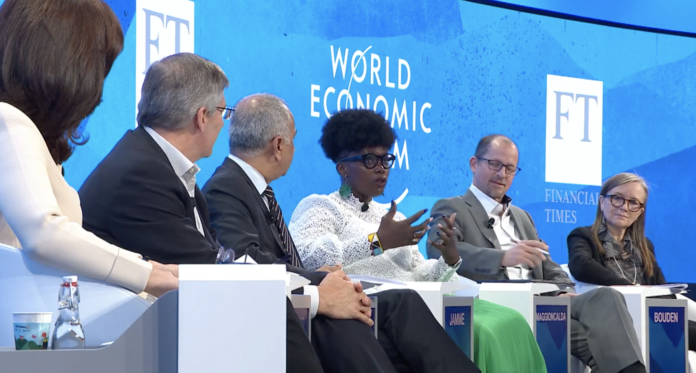Coursera CEO: “If you don’t have connectivity, you’re starving both access to the skill development and the access to the economic opportunity”
As it typically does, the World Economic Forum uses its annual meeting in Davos, Switzerland, as a platform for business and political leaders to discuss how to manage complex, intertwined global mega-trends. And this was apparent in a panel focused on reskilling the global workforce during which speakers narrowed in on the role of connectivity (and of telecom operators and ecosystem stakeholders providing it) in making accessible educational content to as many people as possible as quickly as possible.
As to the intertwined trends, the telecoms set is aware that they have a fundamental role to play in extending connectivity to under- and un-served communities; they’ve also made clear that governments have a fundamental role to play in terms of providing the incentives needed to deploy broadband infrastructure in those communities. As we saw during the COVID-19 pandemic, connectivity underlines the ability for education to continue outside of classrooms. If you extend that premise to the existing labor force and those looking to join the labor force but for want of useful skills, connectivity supports learning, learning makes for a more capable labor force, a more capable labor force makes for a more robust economy.
But there’s another layer. 5G is being globally peddled as essential to connecting the unconnected. But 5G, in its purest form, is a software-defined, cloud-native technology. Here’s the other layer: operators themselves, looking to leverage 5G to its highest and best use, have roundly identified skills gaps in their own organizations against the backdrop of a move from hardware-first to software-first operational paradigms.
Lady Marieme Jamme in 2017 launched the iamtheCODE initiative with the goal of training 1 million girls in Africa in coding; the effort is a collaboration between government, businesses and investors. Speaking in Davos, Jamme said the reason she does what she does was born out of frustration with access to infrastructure, content and connectivity. Drawing a standing ovation from attendees, Jamme recounted her story of not learning the alphabet until the age of 16, then learning seven coding languages in two years. “Somebody like me is not supposed to be in this room,” she said. “If we’re going to talk about digital skills and reskilling people…we need to meaningfully give people access but invest in the last mile of education so girls like me can sit down here in 2030 sharing their stories.
Jamme continued: “I’m building the largest pipeline of coders in the world…If you don’t invest now, [in] 2030, don’t ask me for my Java coders…[The] thing everyone is struggling with right now is connectivity. It’s not everyone who’s got Wi-Fi…We really need to look into our heart again to think about what can we do to take care of our people? As I said to our president, if you don’t take care of people, they will take care of you.”
Coursera CEO Jeff Maggioncalda called connectivity “essential.” Tying connectivity-enabled learning to workforce development and economic growth, he said, “Not only is learning opportunity accessible through technology, job opportunities increasingly are accessible through technology. So if you don’t have connectivity, you’re starving both access to the skill development and the access to the economic opportunity. That’s a problem governments need to solve and I think they can do with telecom providers.” He called for public/private cooperation around zero-rating access to certain educational websites, as well as investment in public Wi-Fi hot spots “where you can at least have intermittent access to the internet…Wi-Fi is really valuable.”

